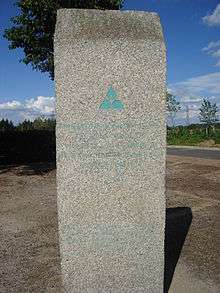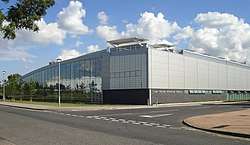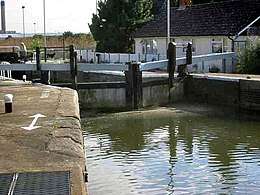Picketts Lock
Pickett's Lock or Picketts Lock is an area of Edmonton, in the London Borough of Enfield. It is bordered by River Lee Navigation to the east, Pickett's Lock Lane to the south, Meridian Way A1055 to the west and the Ponders End industrial area to the north. The area takes its name from Pickett's Lock, a lock on the nearby River Lee Navigation.
History
Historically the land was marshland and the hamlet here was known as Marshside. During the twentieth century the land was used for sand and gravel extraction [1] which helped to form the waters known as the Blue Lakes.


The area was used by local people for outdoor pursuits such as shooting,[2] angling, and ferreting, and is described in Terry Webb's book An Edmonton Boy: "My playground, the River Lea has now been changed into part of the Lee Valley Regional Park; it's been changed into an official playground but it's not the same with things being done for you."[3]
After World War II the lakes were used for landfill. The former gravel workings were a key site for investigation of Pleistocene interglacial deposits.[4][5]
During the late 1960s the area was acquired by the Lee Valley Regional Park Authority (LVRPA) to form part of the Lee Valley Park.[6] The Pickett's Lock Sports Centre designed by the Williamson Partnership with J.M.V Bishop of the (LVRPA) It was described in the Buildings of England as being "three large white functional boxes arranged around a central swimming pool, linked by generous circulation areas. Made a little less bleak by additions of 1993-4: restaurant, cafe and cinema, and an entrance block by Fitzroy Robinson & Partners".[7] Also included were a nine-hole golf course and outdoor sports facilities and was completed by 1973 as the largest centre of its kind in Europe. One of the earliest International Events held at the centre was the first World Age Group Trampoline Championships which were organised by Ted Blake. In later years, land including a disused sewage farm to the north of the centre was used to extend the golf course, and includes a man-made water known as Ponders End lake 51.6352°N 0.0333°W.
National Athletics Stadium
It was announced on 24 March 2000[8] that the site known then as the Lee Valley Leisure Centre was to be the location of the National Athletics Stadium. Shortly afterwards, on 3 April 2000, it was also announced that the site would be the venue of the 2005 World Athletics Championships. The proposed stadium had a capacity of 43,000 and an original cost of £87m and included new training facilities for athletes as part of the design the High Performance Centre. The project was completely abandoned by the Government in October 2001 on the grounds of increased costs and inadequate transportation links.[8] Ultimately, the UK had to forfeit the right to host the 2005 World Athletics Championships. However, the LVRPA, Sport England and UK Athletics went ahead with plans to create the most modern athletics training venue in the south of England on the site to be known as the Lee Valley Athletics Centre which was formally opened in 2007 and forms part of the Lee Valley Leisure Complex. The original 1973 Pickett Lock Sports Centre closed in 2002 and was demolished in 2004.
In popular culture
The now demolished Picketts Lock Sports Centre is featured in the BBC comedy Some Mothers Do 'Ave 'Em, with Michael Crawford roller-skating in and around the centre.[9]
References
- "Edmonton: Economic history". A History of the County of Middlesex: Volume 5: Hendon, Kingsbury, Great Stanmore, Little Stanmore, Edmonton Enfield, Monken Hadley, South Mimms, Tottenham (1976), pp. 161-172. 1976. Retrieved 25 February 2008.
- Curtis, A and Speakman, F. A Poacher's Tale p52 ISBN 0-7135-0969-4 George Bell & Sons 1960 Retrieved 6 March 2008
- Webb, T. An Edmonton Boy ISBN 1-903981-00-X Chapter2 Published by Biograph in 2000 Retrieved 6 March 2008
- Ellison R.A. et al. 2004, Geology of London: Special Memoir for 1:50,000 Geological sheets 256 (North London), 257 (Romford), 270 (South London) and 271 (Dartford) (England and Wales), British Geological Survey, Keyworth, ISBN 0-85272-478-0
- Gibbard, Philip Pleistocene History of the Thames Valley p109 ISBN 0-521-40209-3 Retrieved 14 March 2008
- British History online (fn85) Retrieved 5 March 2008
- Cherry, Bridget; Pevsner, Nikolaus (1998). London 4: North. The Buildings of England. p. 426. ISBN 0-14-071049-3.
- UK running track directory Retrieved 7 March 2008
- Some Mothers Do 'Av 'Em video Retrieved 16 April 2008



